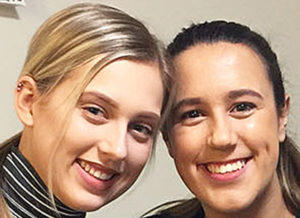By Steve Nakata, Administrative Services
 PULLMAN, Wash. – Most of Washington State University’s 4,000-plus freshmen don’t meet their roommates until arriving on campus at the start of the school year. But 84 percent report getting along well with each other several months later.
PULLMAN, Wash. – Most of Washington State University’s 4,000-plus freshmen don’t meet their roommates until arriving on campus at the start of the school year. But 84 percent report getting along well with each other several months later.
High roommate satisfaction is consistently one of the highlights at WSU of the annual national college experience assessment Skyfactor, formally known as the Educational Benchmarking Inc. (EBI) Survey. In November every residence hall student was invited to participate in the 100-question survey, which included four questions asking whether or not their roommate respects their private time, study time, sleep time and property.
“It’s rewarding when students who initially didn’t know each other, and maybe even hit a rough patch or two along the way, often end up living with each other for many years,” said Coree Newman Coronado, associate director of WSU Residence Life. “We love to see that happen.”
Automation helps find a good match
It doesn’t happen by accident. While about 20 percent of students applying for housing have a roommate in mind, the other 80 percent benefit from computer-aided matching and a robust agreement and mediation process.

Each student completes an extensive questionnaire as part of their housing application. In addition to standard queries – are they willing to live with someone who smokes, dinks alcohol, goes to bed late – others probe deeper into tolerance levels – what is your preferred room temperature, do you ever sleep with the windows open, do you mind if your roommate invites visitors to your room, are you interested in having intellectual discussions with your roommate.
“As you can imagine, it is difficult to find an exact match on every question for everyone who has applied,” said Katy Lenning, reservations coordinator in WSU Housing Services. But an automated reservation system, Odyssey, categorizes applicants based upon the basic questions, then drills down to more minute lifestyle preferences.
Mackenzie Wilcox, a resident of Community Duncan Dunn, remembers responding to those questions and being excited about meeting someone new with a similar lifestyle.
“We both like to wake up early on the weekdays, sleep in and clean on the weekends,” she said. “I think the matching system works really well for the most part,” agreed her roommate, Makenzi Wheless.
Open communication, mediation
In addition, resident advisors (RAs) on each hall floor ask students to complete a roommate agreement – a written document that each roommate signs. It outlines the rights and responsibilities they have as residents in the hall. It also asks them to decide what they want to share – from clothing and utensils to video games and books.
Wilcox and Wheless said talking about those issues with their RA was helpful. So was keeping open lines of communication with each other throughout the year.
“You can go crazy living together in such a small space,” said Wilcox. “But you have to be mature and always talk through any issues that arise.”
“One of the reasons Mackenzie and I have made a good pair is that we stuck to the agreements we made at the beginning of the year,” added Wheless.
For those roommates that fudge on their agreements, resulting in disputes, Newman Coronado said an RA typically steps in to help mediate, often with much success.
While Wilcox and Wheless haven’t needed mediation, they said they are impressed with the friendliness and helpfulness of residence hall staff – another characteristic receiving high marks in the survey.
News media contacts:
Coree Newman Coronado, WSU Residence Life, 509-335-8775, canewman@wsu.edu
Steve Nakata, WSU Administrative Services communications, 509-335-1774, nakata@wsu.edu